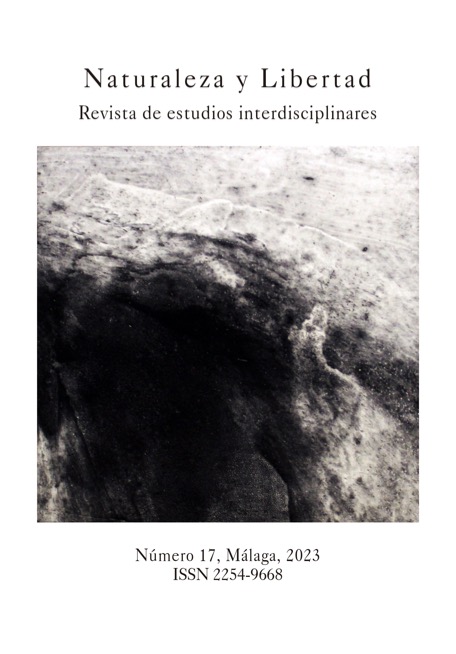On the On the problem of free will in Modernity
From Hobbesian determinism to Kantian postulation
DOI:
https://doi.org/10.24310/nyl.17.2023.16716Keywords:
free will, determinism, Hobbes, Kant, freedom, willAbstract
With the rise and development of the European scientific revolution since Sixteenth and Seventeenth centuries, which eventually finished Aristotelian physics and teleology to reduce the worldview to an efficient relation between causes and effects, one of the fundamental assumptions in Western metaphysics and ethics entered into crisis too: the question of free will. After all, if the whole physical nature was submitted to necessary, universal and unbreakable causes, from which nothing can escape, and the human being was also a body within that nature, why should they not be equally determined? Throughout this article I will try to present what the irruption of Modernity meant about the debate of «free will»; how the figure of Hobbes, due to cartesian philosophy, became a representative of materialist determinism —although not the only one—; and the solution to the dilemma offered by Kant with his well-known postulate of freedom.
Downloads
Metrics
References
Aristóteles (2007a): Ética Nicomáquea y Ética Eudemia, en Ética. Madrid: Gredos.
Aristóteles (2007b): Física. Madrid: Gredos.
Aristóteles (2007c): Metafísica, Madrid: Gredos.
Berlin, I. (2008): Dos conceptos de libertad y otros escritos. Madrid: Alianza.
Copérnico, N. (2009): Sobre las revoluciones (de los orbes celestes). Madrid: Tecnos.
De Hipona, A. (2009): El libre albedrío, en Obras Completas de San Agustín III. Ma-drid: Biblioteca de Autores Cristianos.
Descartes, R. (2005): Meditaciones metafísicas. Oviedo: KRK ediciones.
Epicteto (2012): Obras completas. Madrid: Cátedra.
Freud, S. (1974): «Una dificultad del psicoanálisis», en Obras completas, VII (1916-1924). Madrid: Biblioteca Nueva.
Galilei, G. (1981): El ensayador. Buenos Aires: Aguilar.
Hobbes, T. (1991): Libertad y necesidad y otros escritos. Barcelona: Península.
Hobbes, Th. (2000): De Cive. Madrid: Alianza.
Hobbes, Th. (2009): Leviatán. Madrid: Alianza.
Hobbes, T. (2015): Sobre la libertad y la necesidad. Madrid: Escolar y Mayo.
Jiménez, A. (2022): «Praktische Anwendung» o la dimensión práctica de la aplicación de las categorías. Hildesheim: Georg Olms Verlag.
Kant, I. (2005): La metafísica de las costumbres. Madrid: Tecnos.
Kant, I. (2008): Fundamentación para una metafísica de las costumbres. Madrid: Alianza.
Kant, I. (2009): La religión dentro de los límites de la mera Razón. Madrid: Alianza.
Kant, I. (2010): Crítica de la razón pura. Madrid: Taurus.
Kant, I. (2011): Crítica de la razón práctica. Madrid: Alianza.
Kant, I. (2017): Lecciones de filosofía moral. Mrongovius II. Salamanca: Sígueme.
Laplace, P-S. (1985): Ensayo filosófico sobre las probabilidades. Madrid: Alianza.
Leibniz, G.W. (2015): Ensayos de Teodicea. Madrid: Abada.
Lucrecio (2008): La naturaleza. Madrid: Gredos.
Marco Aurelio (2009): Meditaciones. Madrid: Gredos.
Marey, M. (2017): «Sobre un argumento meta-ético y un argumento político en La re-ligión dentro de los límites de la mera razón», Anales del Seminario de Historia de la Filosofía (vol. 34, nº 1), pp. 127-146. DOI: https://doi.org/10.5209/ASHF.55655.
Newton, I. (2022): Principios matemáticos de la filosofía natural. Madrid: Alianza.
Platón (2007): República, en Diálogos IV. Madrid: Gredos.
Reyna, R. (2021): «Reflexión y libertad en la teoría kantiana de la imputación», Clari-dades. Revista de filosofía (vol. 13, nº 1), pp. 207-225. DOI: https://doi.org/10.24310/Claridadescrf.v13i1.8352.
Sánchez-Ostiz, P. (2008): Imputación y teoría del delito. La doctrina kantiana de la imputación y su recepción en el pensamiento jurídico-penal contemporáneo, Montevideo: BdeF.
Spinoza, B. (2007): Ética. Madrid: Alianza.
Spinoza, B. (1988): Correspondencia. Madrid: Alianza.
Stuart Mill, J. (2007): Sobre la libertad. Madrid: Alianza.
Vigo, A. (2010): «Libertad como causa. Heidegger, Kant y el problema metafísico de la libertad», Anuario Filosófico (XLIII/1), pp. 161-181. DOI: https://doi.org/10.15581/009.43.1374.
Vigo, A. (2020): «Ética y derecho según Kant» y «La concepción kantiana del derecho natural», en Vigo, A. Conciencia, ética y derecho. Estudios sobre Kant, Fichte y Hegel. Hildesheim – Zürich – New York: Georg Olms Verlag.
Vigo, A. (2021): Verdad, libertad, acontecer. Estudios heideggerianos II, Berlin: Logos Verlag.
Downloads
Published
How to Cite
Issue
Section
License
Copyright (c) 2023 Nature & Freedom. Journal of Interdisciplinary Studies.

This work is licensed under a Creative Commons Attribution-NonCommercial-ShareAlike 4.0 International License.
Those authors who have publications with this journal, accept the following terms:
1. Copyright and licensing information are clearly described on the journal’s web site: all content published in Naturaleza y Libertad is open acces without limit, and are subject to the Attribution-NonCommercial-ShareAlike 4.0 International (CC BY-NC-SA 4.0) license. The full text of which can be consulted at https://creativecommons.org/licenses/by-nc-sa/4.0/
2. It is the responsibility of the authors to obtain the necessary permissions for the images that are subject to copyright. The authors whose contributions are accepted for publication in this journal will retain the non-exclusive right to use their contributions for academic, research and educational purposes, including self-archiving or deposit in open access repositories of any kind. The electronic edition of this magazine is edited by the Editorial de la University of Malaga (UmaEditorial), being necessary to cite the origin in any partial or total reproduction.
3. This journal allows and encourages authors to publish papers on their personal websites or in institutional repositories, both before and after their publication in this journal, as long as they provide bibliographic information that accredits, if applicable, your posting on it.
4. In no case will anonymous papers be published.





18.png)













